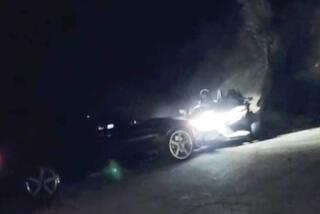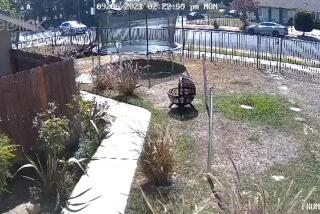Views Collide on ‘Wreck Check’ Car Repair Analysis
- Share via
It can get lonely out there when you decide to take on the insurance industry and its auto repair compensation policies.
That’s what the owner of Rocco’s Collision Center in Hawaiian Gardens has been finding as he employs a controversial computerized system called Wreck Check to determine which repairs are in order for a car involved in a collision. He also uses the program to assess whether repairs made by other shops have been done correctly.
Rocco Avellini says he has used Wreck Check about 300 times in post-repair inspections, priced at $150, and has yet to find a single repair done properly.
Usually the additional work that he determines to be needed is costly. He agrees that his own prices are 30% to 50% higher than those at most body shops, but insists this does not mean he is too high. Rather, he believes the bills that insurers are willing to pay at the other shops are too low.
Avellini and Wreck Check inventor James Lynas of Marietta, Ga., are also proponents of the diminished value concept, which holds that a car that has been in an accident invariably has a diminished resale value. They say insurers ought to compensate car owners for that as well.
Companies in California only rarely pay for diminished value.
In recent months, Avellini says, numerous customers have told him that insurer representatives have advised them not to leave their cars with him.
After Farmers dropped Rocco’s from its preferred circle of repairers, vaguely citing a low volume of business, Avellini began sending letters to Farmers employees who he had been told by customers were critical of him.
Responding to his questions, the representatives all denied saying such things.
But notwithstanding the denials, I found Farmers and others embroiled with Avellini quite critical of him in a number of particulars.
Kitty Miller, a Farmers spokeswoman, said, “We would never disparage an auto body repair shop or try to hurt their business. . . .
“However, we certainly encourage policyholders to use one of our Circle of Dependability shops, because we guarantee the work, and we guarantee the parts for as long as the customer owns the car.”
Miller said skeptically of Wreck Check, “It seems you would have to have a pretest and a post-test, determining what the condition of the vehicle was before it was wrecked, to have a base to compare it to after the repair.”
As for diminished value, she said, “We don’t recognize it. . . . If the auto is repaired correctly and it meets manufacturers’ specifications, how can it be worth less?
“It may actually be in better condition than the day it was wrecked, and an analogy is: When I was in the market for a used washing machine, I wanted one that had been reconditioned with new hoses, overhauled, because I believed a reconditioned washing machine to be in better shape than one that had not been.”
Avellini responded: “Ask anyone buying a used vehicle whether they would prefer a previously damaged over an undamaged. I have never met one [who would prefer a previously damaged vehicle]. Consumers are much smarter than that.”
As for Miller’s questioning Wreck Check because obviously there is no evaluation before an accident, Avellini said:
“We can tell the way the vehicle was before the wreck by looking at the undamaged parts and the wear and tear. We then look at the parts that have been fixed to see the post-repair state of the car.”
One case pending at Avellini’s shop concerns an Allstate-insured vehicle, a Chevrolet Astro van owned by Cecil and Rosalee Maupin of Carson. It too illustrates some of the issues that are sources of contention in the auto repair field.
The car was in a severe accident in 1997. After eight months of repairs costing Allstate $12,415 at Y and S Body Shop in San Pedro, the Maupins say, the car still had severe transmission problems, shook on the road and had a malfunctioning air conditioner, among other things.
When they took it in for a Wreck Check at the end of 1998, Avellini found a need for additional repairs of $12,317.
Allstate has now decided to send a mechanical engineer to inspect the van, not inexpensive in itself, and says it is willing to finance any necessary repairs.
In a Feb. 8 letter to Maupin, Wade Sill, an Allstate manager, said that Y and S was willing to honor its guarantee but that Allstate would also be open to considering someone else to do the job.
The Maupins say they want no further part of Y and S. They say they want to use Avellini.
But when I went to see Younan Safar, the owner of Y and S, I found him angry. He charged that Avellini has “a personal vendetta” against him, and added that Daniel Hegybeli of the state Bureau of Automotive Repair had said Avellini and Wreck Check are unreliable.
Although Safar said he used recycled parts on the Maupins’ van because Allstate wanted it that way, he vowed to stand by his guarantee 100% and pay for any additional repairs.
Hegybeli denied making the statements Safar attributed to him and referred me to a Bureau of Automotive Repair spokesman in Sacramento who was quite critical of the Wreck Check computer program.
The spokesman, Russ Heimerich, said: “It’s difficult for me to believe that anyone, computerized or no, can tell the quality of auto repairs. You have to scrape down the paint, look at the welds, and it’s difficult to do that in a nondestructive manner. It’s difficult to believe someone with a computer analysis can tell you whether auto body work is good or bad.”
Avellini responded, “The improper repairs are so obvious, there’s no need to take the car apart. . . . Wreck Check doesn’t report anything but the facts.”
Lynas, the inventor of Wreck Check, remarked, “You can see the defects of some of these repairs from across the parking lot.”
Seems as if everyone is getting pretty excited. But it also seems there are serious problems with car repairs, guaranteed or not.
Ken Reich can be contacted with your accounts of true consumer adventure at (213) 237-7060 or by e-mail at: ken.reich@latimes.com






